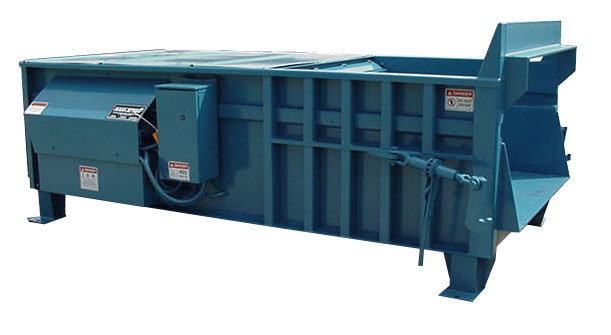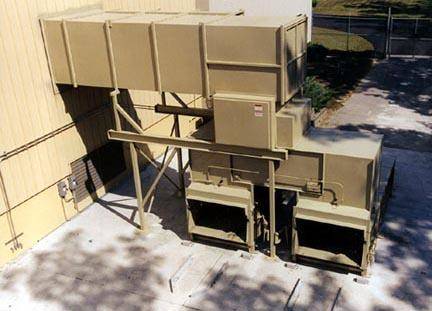How Commercial waste compactor equipment helps with cost efficiency
Wiki Article
The Duty of Waste Equipment in Encouraging Sustainable Garbage Disposal Practices
Waste Equipment serves a basic role in advancing lasting waste disposal techniques. It encompasses a variety of tools designed to enhance the efficiency of waste partition, collection, and handling. By utilizing Equipment such as compactors, shredders, and reusing bins, neighborhoods can greatly decrease their dependence on land fills. The impact of these devices expands past capability. Recognizing their wider effects discloses understandings right into how they shape ecological responsibility and community involvement. What exists in advance in this progressing landscape?Comprehending Waste Equipment and Its Relevance
Waste Equipment plays an important duty in efficient waste administration systems. It incorporates a variety of devices and machinery developed to handle, process, and get rid of waste materials effectively. Understanding waste Equipment is essential for services, companies, and districts aiming to implement sustainable waste disposal practices - Commercial garbage compaction equipment. Effectively functioning waste Equipment not only streamlines the collection and transport of waste however also lessens environmental influence by guaranteeing that waste is taken care of properlyThe value of waste Equipment encompasses improving reusing efforts, reducing land fill use, and advertising resource recovery. Equipment such as shredders, balers, and compactors facilitate the handling of waste, making it easier to separate recyclable products from general refuse. In addition, advancements in waste modern technology add to the advancement of even more eco pleasant solutions, thereby enhancing the dedication to sustainability. On the whole, waste Equipment functions as a keystone for reliable waste management, cultivating a cleaner and healthier atmosphere for future generations.
Types of Waste Equipment for Effective Waste Monitoring
Efficient waste administration relies upon different kinds of Equipment developed to deal with details disposal requirements. Amongst these, compactors play an important duty by lowering the volume of waste, making transportation extra efficient. Shredders are important for breaking down big things, helping with simpler handling and disposal. In addition, balers compress recyclable products right into workable bundles, maximizing storage and transportation.Containers and containers are basic for gathering waste at the source, guaranteeing proper partition and minimizing contamination. For dangerous products, specific Equipment, such as drum crushers and leak-proof containers, is necessary to guarantee safety and security and compliance with guidelines.
Finally, transportation automobiles equipped with hydraulic systems boost the effectiveness of waste collection and disposal processes. Each kind of waste Equipment adds to a streamlined waste management system, promoting sustainability and lowering ecological effect with reliable disposal practices.
The Function of Recycling Bins in Lasting Practices
Recycling containers play an important function in advertising sustainable practices by promoting effective waste separation. By giving assigned containers for recyclable products, they motivate people to adopt eco-friendly habits. This straightforward application significantly adds to reducing land fill waste and enhancing recycling prices.Effective Waste Splitting Up
Correct waste splitting up plays a crucial duty in promoting sustainable practices, and reusing containers act as a substantial device in this procedure. By clearly comparing recyclables, compostables, and general waste, these containers facilitate effective sorting, lessening contamination and optimizing recycling performance. Their strategic positioning in public and private spaces motivates people to take part in liable waste disposal. Additionally, the use of color-coded bins aids to streamline the splitting up procedure, making it instinctive for users. This organizational strategy not only enhances recycling prices yet additionally elevates understanding regarding the relevance of waste administration. Essentially, recycling containers are essential elements that sustain reliable waste separation, ultimately adding to a more sustainable environment and lowering the general stress on land fills.Motivating Eco-Friendly Actions
Although individuals might be inclined to ignore their effect on the environment, the visibility of reusing bins substantially affects environmentally friendly actions. These containers work as aesthetic tips, motivating individuals to different recyclables from general waste. Their tactical placement in public spaces advertises accessibility, making it much easier for individuals to embrace sustainable methods. Research studies suggest that when reusing containers are available, recycling prices enhance significantly, showing a direct correlation in between infrastructure and actions. In addition, colorful signs on these containers enlightens users about what products can be recycled, lowering contamination prices. By cultivating a culture of recycling, these containers not only assist in proper waste management but additionally influence a collective responsibility toward ecological stewardship, inevitably adding to a more lasting future.Composting Systems: Turning Waste Into Resources
Composting systems work as a vital tool in changing natural waste right into important resources, supplying countless ecological benefits. Numerous kinds of composting Equipment deal with different needs, making the procedure available to both communities and individuals. Recognizing the composting process is necessary for optimizing its performance and promoting lasting waste administration practices.Advantages of Composting Systems
Many communities are progressively identifying the countless benefits of composting systems, which transform organic waste right into beneficial resources. These systems successfully reduce garbage dump waste, thereby decreasing greenhouse gas emissions and saving natural deposits. By converting food scraps, lawn waste, and other organic products into nutrient-rich compost, they boost dirt wellness and fertility, promoting lasting farming practices. Composting aids to retain dampness in the soil, decreasing the need for chemical fertilizers and watering. It fosters biodiversity by supplying an environment for useful microbes and insects. Furthermore, composting enlightens individuals about environmental stewardship, urging a culture of sustainability. Generally, composting systems play a necessary duty in developing a circular economic situation, where waste is reduced, and resources are recycled.Kinds of Composting Equipment
A selection of composting Equipment is available to help with the effective processing of natural waste into valuable garden compost. These systems range from basic backyard compost containers to innovative business composters. For home use, stemless glass and static containers are popular, enabling workable aeration and mixing. Aerated static stacks utilize blowers to enhance air movement, considerably speeding up decay. Large-scale operations might utilize in-vessel composters, which control temperature level and moisture for suitable composting problems. Worm composters, or vermicomposting systems, harness the all-natural digestion procedures of worms to damage down raw material. Furthermore, chippers and shredders aid prepare materials by lowering dimension, promoting faster malfunction. Each sort of Equipment serves details requirements, enabling varied composting methods that add to sustainable waste administration.Composting Refine Explained
The composting process changes natural waste right into nutrient-rich resources with a collection of biological and chemical responses. Microorganisms such as bacteria and fungis break down natural products, including food scraps and yard waste. This disintegration produces heat, assisting in more microbial activity and increasing the breakdown process. As the garden compost grows, the temperature lowers, allowing valuable organisms to flourish. The visibility of oxygen is crucial, advertising cardiovascular conditions that improve microbial efficiency. Throughout this procedure, carbon-to-nitrogen ratios need to be kept to maximize disintegration. Completion outcome is humus, a dark, brittle compound abundant in nutrients, which can be utilized to enrich dirt, assistance plant growth, and add to lasting agricultural practices.Cutting-edge Technologies in Waste Collection and Disposal
As cities come to grips with increasing waste volumes and environmental problems, innovative innovations in waste collection and disposal emerge as important options. Smart waste containers equipped with sensing units track fill levels, maximizing collection paths and lowering fuel consumption. These bins can additionally connect with waste administration systems, promoting prompt pick-ups and decreasing overflow issues. Furthermore, independent vehicles, consisting of drones and robot systems, are being released to boost operational effectiveness in waste collection.Advancements in arranging technologies, such as expert system and machine understanding, enable much more efficient reusing processes by rapidly recognizing and dividing materials. Waste-to-energy innovations convert organic waste into sustainable energy, decreasing landfill reliance and contributing to energy sustainability. These developments not only improve waste administration practices but additionally promote a round economic climate, thus promoting a sustainable approach to waste disposal. Eventually, the combination of these modern technologies plays a crucial duty in attending to city waste obstacles and improving ecological stewardship.
Area Interaction With Waste Equipment
While efficient waste management relies greatly on sophisticated technologies, neighborhood engagement with waste Equipment plays a crucial duty in promoting sustainable methods (Commercial garbage compaction equipment). Waste Equipment, such as recycling bins and composting stations, offers not just as practical tools but additionally as catalysts for area awareness and involvement. By placing these resources in available areas, communities motivate people to take an energetic function in waste reduction and recycling effortsEducational campaigns going along with waste Equipment installments can additionally improve area involvement, leading homeowners on appropriate disposal methods and the benefits of lasting techniques. In addition, neighborhood occasions that utilize waste Equipment, such as clean-up drives and reusing obstacles, inspire cumulative action and develop a sense of obligation amongst area members.

The Future of Waste Administration and Lasting Solutions
Technologies in modern technology and shifts in societal mindsets are forming the future of waste monitoring and lasting options. Smart waste monitoring systems, utilizing IoT devices, are enabling real-time tracking of waste degrees, enhancing collection courses, and lowering carbon impacts. These advancements not only boost efficiency yet additionally advertise recycling and composting efforts by providing data-driven understandings.
The surge of circular economic situation techniques motivates business to reconsider product style, concentrating on reusability and recyclability. This change fosters a culture of sustainability, where consumers are significantly requiring green products.
Furthermore, area involvement in waste monitoring is coming to be significantly crucial, with curricula encouraging individuals to take obligation for their waste. As governments worldwide carry out stricter laws on waste disposal, areas and businesses are prompted to embrace lasting techniques. With each other, these aspects lead the way for a future where waste is minimized, and resources are saved, guaranteeing a healthier world.
Regularly Asked Questions

How Can Companies Benefit Financially From Purchasing Waste Equipment?
Purchasing waste Equipment can cause considerable financial Commercial trash compaction equipment benefits for businesses. By enhancing efficiency, lowering disposal costs, and enhancing reusing capabilities, business can decrease operational costs and potentially create earnings with recouped products.What Laws Control using Waste Equipment in Various Regions?
Different regulations govern waste Equipment use, differing by area. These include ecological requirements, safety and security methods, and operational guidelines, aimed at making sure conformity, advertising public health, and reducing ecological impact related to waste management methods.How Do I Choose the Right Waste Equipment for My Demands?
Choosing the proper waste Equipment requires evaluating particular waste types, volume, and disposal techniques. Researching available options, speaking with specialists, and thinking about regulatory conformity will aid in making an informed decision customized to individual needs.What Are the Ecological Impacts of Ineffective Waste Equipment?
Ineffective waste Equipment can lead to boosted emissions, greater power consumption, and better garbage dump overflow. It commonly results in incorrect waste segregation, aggravating air pollution and negatively affecting communities, which ultimately hinders lasting waste administration efforts.Exactly How Can Waste Equipment Be Maintained for Optimum Performance?
Waste Equipment can be kept for peak performance with routine inspections, prompt fixings, appropriate cleaning, and adherence to maker guidelines. This guarantees performance, prolongs Equipment life expectancy, and decreases ecological influence throughout waste monitoring procedures.Waste Equipment plays an essential duty in reliable waste administration systems. Recognizing waste Equipment is crucial for organizations, organizations, and towns intending to apply sustainable waste disposal techniques. While effective waste administration depends heavily on advanced technologies, community interaction with waste Equipment plays an important role in fostering sustainable methods. Neighborhood involvement in waste monitoring is ending up being increasingly vital, with instructional programs encouraging people to take responsibility for their waste. Choosing the suitable waste Equipment requires reviewing specific waste types, quantity, and disposal approaches.
Report this wiki page